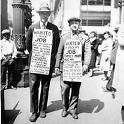Recovering Depression-Era Values
One of the more enjoyable aspects of being a pastor is being able to spend time with living history. By "living history" I mean the elderly; people who possess a rich depository of firsthand experience with the past. The elderly most interesting of late involve those with experiences from the Great Depression. Now in their 80's and 90's, this generation, like those of WWII, is disappearing at a rapid rate. Few remain to pass on their wisdom. So when I am able to, I deliberately try to get them to talk about those days. I don't care if it derails a Bible class temporarily, or if it prolongs a shut-in visit. Their experiences will too soon pass into secondhand recollection and I need to hear their voice of faith before it fades forever. These unique treasure keepers possess for us an especially valuable memory: survival in one of history's most devastating economic disasters. Every day I listen to increasingly depressing reports of a faili

